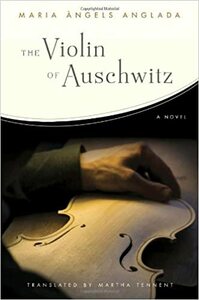You need to sign in or sign up before continuing.
Take a photo of a barcode or cover
A short book, but a powerful one. Actual Nazi documents lead the chapters. And within are found both the atrocities inflicted on the Jewish prisoners and the various ways that the human spirit manages to continue to survive. The undercurrent of music quietly leaves it's mark on the reader.
This sparse novel examines a theme similar to Viktor Frankl's Man's Search for Meaning. The austerity of both the writing and the story seemed appropriate to me. Anglada's prose (and Tennent's translation) is often most poetic when the content is most horrible. This serious piece has a lightness to it that makes the subject bearable. I am glad to have read it.
An engaging story, but a little too much telling and not enough showing. Even through Auschwitz is ingrained into the popular memory, there is a distinct lack of place. D.
This was a nice story that clearly demonstrated the power of hope and resilience that existed in the prisoners interned at Auschwitz.
The writing was a bit plain, though maybe it was aimed at a younger age group.
As other reviewers have said, there are many more touching and emotively powerful biographies from this moment of history but this would be a good introduction for school age children.
The writing was a bit plain, though maybe it was aimed at a younger age group.
As other reviewers have said, there are many more touching and emotively powerful biographies from this moment of history but this would be a good introduction for school age children.
Even though the novel is about such a harrowing and emotive subject, the whole thing just felt rushed and you never felt like you got an emotional attachment to any of the characters. I don't think the simplicity of the story really worked in it's favour, as by the end you had an "Oh... Is that it??" kind of feeling - I kept expecting the story to develop into something more and it never did. Disappointing.
It is always delicate to evaluate a story about the Holocaust, because documentary and literary value sometimes can vary a lot. For this story my judgment is really mixed. It may be useful for new generations to be introduced to the greatest horror of the Second World War in a somewhat softer, elegant way than through a raw confrontation with reality, but you have every right to think that only a direct confrontation with that horrible reality is appropriate.
Maria Angels Anglada in this book has chosen the middle way: she offers us the story of the Jewish violin maker, Daniel, who has ended up in a concentration camp and undergoes the inhuman regime there; but by a combination of coincidence and boldness he gets the assignment to build a new violin in the camp, which of course also succeeds. Never mind the frivolous origin of the order (a bet between SS officers for a case of whine), for a while Daniel mentally escapes the abhorrence of camp life. That's it, nothing more to it, I'm afraid.
The story is well balanced and is actually brought as a story within a story. But it's a bit mangling in credibility, and in a certain sense it's too obviously focused on emotional effect. But at the beginning of each chapter, Angels Anglada has placed real SS-documents which, due to their official sobriety, give a slap in the face, and in that sense this booklet does convey something of the incomprehensible insanity that was the holocaust. To me Primo Levi's [b:If This Is a Man|275630|If This Is a Man|Primo Levi|https://images.gr-assets.com/books/1327539197s/275630.jpg|851110] still is the holocaust book that touched my soul the deepest.
Maria Angels Anglada in this book has chosen the middle way: she offers us the story of the Jewish violin maker, Daniel, who has ended up in a concentration camp and undergoes the inhuman regime there; but by a combination of coincidence and boldness he gets the assignment to build a new violin in the camp, which of course also succeeds. Never mind the frivolous origin of the order (a bet between SS officers for a case of whine), for a while Daniel mentally escapes the abhorrence of camp life. That's it, nothing more to it, I'm afraid.
The story is well balanced and is actually brought as a story within a story. But it's a bit mangling in credibility, and in a certain sense it's too obviously focused on emotional effect. But at the beginning of each chapter, Angels Anglada has placed real SS-documents which, due to their official sobriety, give a slap in the face, and in that sense this booklet does convey something of the incomprehensible insanity that was the holocaust. To me Primo Levi's [b:If This Is a Man|275630|If This Is a Man|Primo Levi|https://images.gr-assets.com/books/1327539197s/275630.jpg|851110] still is the holocaust book that touched my soul the deepest.

